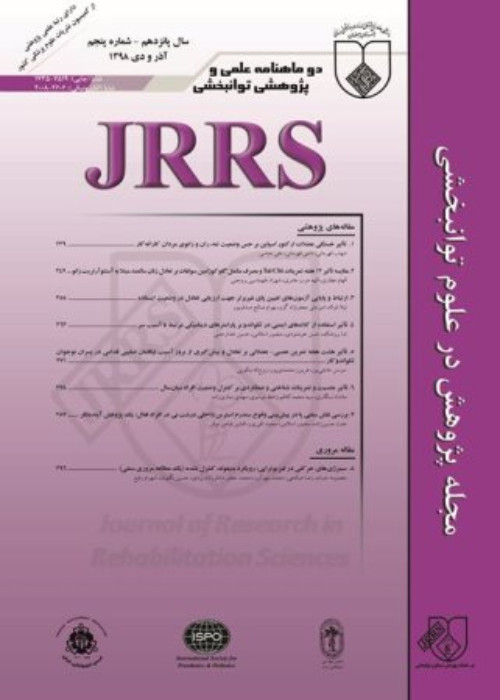Effects of a comprehensive cardiac rehabilitation program on the quality of life of patients with cardio-vascular diseases
Author(s):
Abstract:
Introduction
Health- related quality of life (HRQOL) is an important factor to evaluate the effects of different interventions on cardiovascular diseases. Improvement in HRQOL is an important goal for individuals participating in cardiac rehabilitation (CR) programs. In Iran, however, published data are lacking in this regard. The purpose of this study is assessing the impact of cardiac rehabilitation (CR) on HRQOL in patients with coronary artery disease (CAD).Materials And Methods
In this queasy-experimental study the files of 100 patients with coronary artery disease (CAD) who were referred to rehabilitation department of Isfahan cardiovascular research center were studied using a randomized sampling method. Demographic data, height, weight and waist circumference were measured. To determine the risk of the disease and designing exercise program, all patients performed an exercise test so that their echocardiography, exercise capacity and ejection fraction were defined before cardiac rehabilitation (CR). Exercise intensity was obtained based on 60 - 80 percent of maximum heart rate during the exercise test. A validated questionnaire called Short-Form 36 Health Status Survey (SF-36) was applied by a trained person to evaluate HRQOL. Cardiac rehabilitation (CR) consisted of 24 sessions each of which included a warm-up, aerobics, a cool-down and relaxation as well as 8 sessions to educate risk factor modification under supervision of rehabilitation team. Finally all the exams were repeated and data was analyzed based on sex and age groups (≥ 65 and < 65 years) using SPSS12 at level of P < 0.05 via independent t test. To compare the quality of life (QOL) score before initiation and after termination cardiac rehabilitation (CR), paired t-test was used.Results
After cardiac rehabilitation (CR) program, scores of all physical domains of the SF-36 including physical problems, role limitations due to physical problems, vitality and bodily pain improved significantly (P < 0.05) compared to the baseline data. There was not any difference between age groups (≥ 65 and < 65 years) but women had significantly greater improvement regarding physical problems and mental health (P < 0.05).Conclusion
These results indicate that cardiac rehabilitation (CR) improves the quality of life (QOL) in cardiac patients, especially in women. It was also noted that elderly patients can gain same benefits as other patients.Language:
Persian
Published:
Journal of Research in Rehabilitation Sciences, Volume:7 Issue: 4, 2012
Page:
516
https://magiran.com/p975332
دانلود و مطالعه متن این مقاله با یکی از روشهای زیر امکان پذیر است:
اشتراک شخصی
با عضویت و پرداخت آنلاین حق اشتراک یکساله به مبلغ 1,390,000ريال میتوانید 70 عنوان مطلب دانلود کنید!
اشتراک سازمانی
به کتابخانه دانشگاه یا محل کار خود پیشنهاد کنید تا اشتراک سازمانی این پایگاه را برای دسترسی نامحدود همه کاربران به متن مطالب تهیه نمایند!
توجه!
- حق عضویت دریافتی صرف حمایت از نشریات عضو و نگهداری، تکمیل و توسعه مگیران میشود.
- پرداخت حق اشتراک و دانلود مقالات اجازه بازنشر آن در سایر رسانههای چاپی و دیجیتال را به کاربر نمیدهد.
In order to view content subscription is required
Personal subscription
Subscribe magiran.com for 70 € euros via PayPal and download 70 articles during a year.
Organization subscription
Please contact us to subscribe your university or library for unlimited access!



